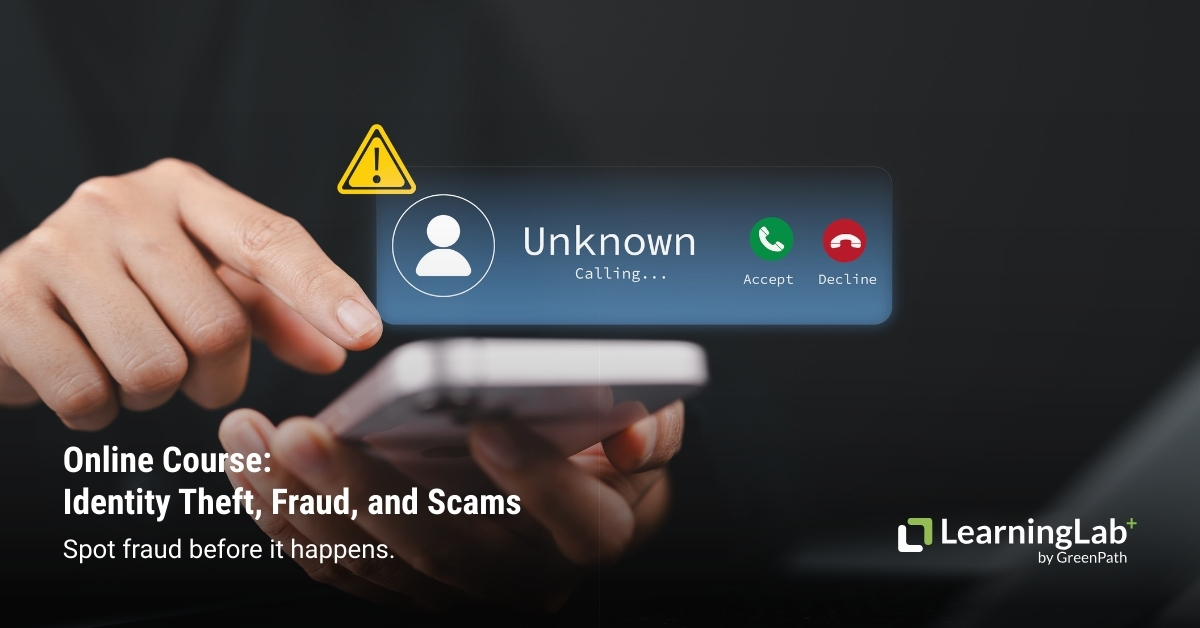Awareness is often the best prevention for common scams.
At TCT we see these scams happen all too often and we encourage you to understand how they work, how to identify a potential scam, and protect yourself from falling victim. Please share this knowledge with others in your life.
Online Course: Identity Theft, Fraud, and Scams
Course Length: 15 Minutes
Can you spot an online scam? Let’s find out. This short, self-paced course helps you understand the risks of fraud, scams, and identity theft—and gives you practical steps to protect yourself.
- Online Shopping – Buyer Beware!
- Beware of E-Check Scams: Why Emailed Checks Are Always Fraudulent
- Identity Theft Can Happen to Anyone
- Important Information in the News - If You Have Not Already, Change Your Gmail Password Now
- Safeguarding Your Child’s Identity In Today's World
- Five Ways to Keep Identity Thieves Guessing
- Cyber Security
- Back-to-School Scams
- Protecting Older People from Scams
- Is a scammer getting unemployment benefits in your name?
- Don’t Get Hooked by Phishing
- Elder Financial Exploitation
- Protect Yourself from ATM Skimmers
- Tips to Recognize and Avoid Financial Scams
Scams, Fraud & Security FAQs
If your wallet has been lost or stolen, take the following actions:
- Visit https://www.transunion.com/fraud-alerts or call one of the three major credit reporting agencies (Equifax: 1-800-525-6285, Experian: 1-888-397-3742 and TransUnion: 1-800-680-7289) and ask them to immediately place a Fraud Alert on your name and Social Security number. The alert means any company that checks your credit knows your information was stolen and they have to contact you by phone to authorize new credit.
- Report a lost or stolen TCT debit or credit card: 1-800-721-8288
- File a police report the same day, if at all possible, in the jurisdiction where your wallet was stolen.
When in doubt, don't give it out.
Fraudsters have become increasingly adept at getting cardholders to share the information they need to commit fraud by posing as financial institution call center agents, or by sending text messages that look like they are coming from our institution, warning of suspicious transaction activities. They are also known to call in to call centers posing as cardholders requesting changes to card information and parameters.
The fraudsters do this by using information stolen through data breaches at health insurance providers, reward program providers, credit bureaus, merchant terminals, and social media sites, as well as through malware programs deployed on personal computers, to mention just a few. Stolen personally identifiable information (PII) is combined with stolen card information, resulting in enough information to create profiles that fraudsters can use to position themselves as the actual cardholders.
A phone call from TCT's Card Fraud Department will only include a request for your zip code, and no other personal information unless you confirm that a transaction is fraudulent. Only then will you be transferred to an agent who will ask questions to confirm that you are the actual cardholder before going through your transactions with you. If at any point you are uncertain about questions being asked or the call itself, hang up and call us directly.
• We will NEVER ask you for your PIN or the 3-digit security code on the back of your card. Don’t give them out to anyone, no matter what they say. Hang up and call us directly. Fraudsters will often ask cardholders to verify fake transactions. When the cardholder says no, they did not perform those transactions, the fraudster then says that their card will be blocked, a new card will be issued, and that they need the card’s PIN to put it on the new card. Many people believe this and provide their PIN. The 3-digit CV2 code on the back of the card will allow a fraudster to conduct card-not-present transactions.
• We will NEVER ask for your online banking login information. Don't give that out to anyone. Hang up and call us directly instead.
• Regularly check your account online to see if there are any suspicious transactions that have occurred, but especially If you are unsure about a call or text message you’ve received. If anything looks amiss, call us directly for assistance.
• If you have received a voice- or a text message from us and are unsure about responding to it, call us directly for assistance.
Vishing is the telephone equivalent of phishing. Vishing is the act of using the telephone in an attempt to scam the user into surrendering private information that will be used for identity theft. The scammer usually pretends to be a legitimate business and fools the victim into thinking he or she will profit. TCT will never request this type of information by phone.
Phishing is the act of sending an e-mail to a user falsely claiming to be an established legitimate enterprise in an attempt to scam the user into surrendering private information that will be used for identity theft. The e-mail directs the user to visit a website where they are asked to update personal information, such as passwords and credit card, social security, and account numbers that the legitimate organization already has. The website, however, is bogus and set up only to steal the user’s information. TCT FCU will never send emails requesting this type of information.
If you feel you have been a victim of identity theft, contact the FTC’s Identity Theft Hotline toll-free at 1-877-IDTHEFT (1-877-438-4338); by mail: Identity Theft Clearinghouse, Federal Trade Commission, 600 Pennsylvania Avenue, NW, Washington, DC 20580; or online at www.identitytheft.gov
Here’s how they work:
You get a call from someone who says she’s from the IRS. She says that you owe back taxes. She threatens to sue you, arrest or deport you, or revoke your license if you don’t pay right away. She tells you to put money on a prepaid debit card and give her the card numbers.
The caller may know some of your Social Security number. And your caller ID might show a Washington, DC area code. But is it really the IRS calling?
No. The real IRS won’t ask you to pay with prepaid debit cards or wire transfers. They also won’t ask for a credit card over the phone. And when the IRS first contacts you about unpaid taxes, they do it by mail, not by phone. And caller IDs can be faked.
Here’s what you can do:
1. Stop. Don’t wire money or pay with a prepaid debit card. Once you send it, the money is gone. If you have tax questions, go to irs.gov or call the IRS at 800-829-1040.
2. Pass this information on to a friend. You may not have gotten one of these calls, but the chances are you know someone who has.
Pass it on
Want to know more? Sign up for consumer alerts at ftc.gov/subscribe.
Federal Trade Commission | ftc.gov/PassItOn
Please Report Scams
If you spot a scam, please report it to the Federal Trade Commission.
• Call the FTC at 1-877-FTC-HELP
(1-877-382-4357) or TTY 1-866-653-4261
• Go online: ftc.gov/complaint
Your report can help protect other people. By reporting fraud, you can help the FTC’s investigators identify the scammers and stop them before they can get someone’s hard-earned money. It really makes a difference.
Here’s how they work:
You see an ad on TV, telling you about a new law that requires you to get a new health care card. Maybe you get a call offering you big discounts on health insurance. Or maybe someone says they’re from the government, and she needs your Medicare number to issue you a new card.
Scammers follow the headlines. When it’s Medicare open season, or when health care is in the news, they go to work with a new script. Their goal? To get your Social Security number, financial information, or insurance number.
So take a minute to think before you talk: Do you really have to get a new health care card? Is that discounted insurance a good deal? Is that “government official” really from the government? The answer to all three is almost always: No.
Here’s what you can do:
1. Stop. Check it out. Before you share your information, call Medicare (1-800-MEDICARE), do some research, and check with someone you trust. What’s the real story?
2. Pass this information on to a friend. You probably saw through the requests. But chances are you know someone who could use a friendly reminder.
Pass it on
Want to know more? Sign up for consumer alerts at ftc.gov/subscribe.
Federal Trade Commission | ftc.gov/PassItOn
Please Report Scams
If you spot a scam, please report it to the Federal Trade Commission.
• Call the FTC at 1-877-FTC-HELP
(1-877-382-4357) or TTY 1-866-653-4261
• Go online: ftc.gov/complaint
Your report can help protect other people. By reporting fraud, you can help the FTC’s investigators identify the scammers and stop them before they can get someone’s hard-earned money. It really makes a difference.
Here’s how they work:
You see an ad saying you can earn big money at home. Or one that offers help starting an online business – with a proven system to make money online. Or maybe your resume is on a job search website and someone calls: they want your driver’s license and bank account numbers before they interview you.
What happens next? If you answer the ad to work from home, they’ll ask you for money for training or special access. But there’ll be no job. If you buy that “proven system,” you’ll get pressure to pay more for extra services. But you won’t get anything that really helps you start a business or make money. And if you give that caller your driver’s license and bank account numbers, they might steal your identity or your money.
Here’s what you can do:
1. Stop. Check it out. Never pay money to earn money. And don’t share personal information until you’ve done your research. Search online for the company name and the words “review,” “scam” or “complaint.”
2. Pass this information on to a friend. You probably know how to keep your money and information safe. But you may know someone who could use a friendly reminder.
Pass it on
Want to know more? Sign up for consumer alerts at ftc.gov/subscribe.
Federal Trade Commission | ftc.gov/PassItOn
Please Report Scams
If you spot a scam, please report it to the Federal Trade Commission.
• Call the FTC at 1-877-FTC-HELP
(1-877-382-4357) or TTY 1-866-653-4261
• Go online: ftc.gov/complaint
Your report can help protect other people. By reporting fraud, you can help the FTC’s investigators identify the scammers and stop them before they can get someone’s hard-earned money. It really makes a difference.
Here’s how they work:
You pick up the phone and hear a recorded message — a robocall — or a live person selling something. Maybe it’s not who your caller ID said it was. It’s frustrating, and you just want it to stop.
Recorded sales calls are illegal, unless you give a business written permission to robocall you. If your number is on the Do Not Call Registry, you’re not supposed to get any sales calls — live or recorded. But scammers ignore the rules about when and how they can call you.
Scammers can use technology to make their calls look like they come from anywhere: the IRS, a business you know, a neighbor, or even your own number. Because phone numbers can be faked, you can’t trust your caller ID. So now what?
Here’s what you can do:
1. Hang up. Don’t press a number. Just hang up the phone on unwanted calls. Consider call-blocking services to reduce the number of unwanted calls you get. Ask your phone carrier about call blocking and read expert reviews about your options. Learn more at ftc.gov/calls.
2. Pass this information on to a friend. You may know what to do about unwanted calls, but chances are you know someone who doesn’t.
Pass it on
Want to know more? Sign up for consumer alerts at ftc.gov/subscribe.
Federal Trade Commission | ftc.gov/PassItOn
Please Report Scams
If you spot a scam, please report it to the Federal Trade Commission.
• Call the FTC at 1-877-FTC-HELP
(1-877-382-4357) or TTY 1-866-653-4261
• Go online: ftc.gov/complaint
Your report can help protect other people. By reporting fraud, you can help the FTC’s investigators identify the scammers and stop them before they can get someone’s hard-earned money. It really makes a difference.
Here’s how they work:
Someone might offer you a job. Or say you’ve won a sweepstakes. Or start an online relationship with you. Whatever the story, next they want to send you money – and then ask you to send it on to someone else. They often say to wire the money or use gift cards. But that money is stolen. And there never was a job, a prize, or a relationship – only a scam. That scammer was trying to get you to be what some people call a “money mule.”
If you deposit a scammer’s check, it might clear. But later, when the bank (or credit union) finds out it’s a fake check, you’ll have to repay the bank. And if you help a scammer move stolen money – even if you didn’t know it was stolen – you could get into legal trouble.
Here’s what you can do:
1. Keep your money to yourself. Never agree to move money for someone who contacts you, even if they promise a relationship, job, or prize. You could lose money and get into legal trouble.
2. Pass this information on to a friend. You may see through these scams. But chances are you know someone who could use a friendly reminder.
Pass it on
Want to know more? Sign up for consumer alerts at ftc.gov/subscribe.
Federal Trade Commission | ftc.gov/PassItOn
Please Report Scams
If you spot a scam, please report it to the Federal Trade Commission.
• Call the FTC at 1-877-FTC-HELP
(1-877-382-4357) or TTY 1-866-653-4261
• Go online: ftc.gov/complaint
Your report can help protect other people. By reporting fraud, you can help the FTC’s investigators identify the scammers and stop them before they can get someone’s hard-earned money. It really makes a difference.
Here’s how they work:
You get a call: “Grandma, I need money for bail.” Or money for a medical bill. Or some other kind of trouble. The caller says it’s urgent — and tells you to keep it a secret.
But is the caller who you think it is? Scammers are good at pretending to be someone they’re not. They can be convincing: sometimes using information from social networking sites, or hacking into your loved one’s email account, to make it seem more real. And they’ll pressure you to send money before you have time to think.
Here’s what you can do:
1. Stop. Check it out. Look up your grandkid’s phone number yourself, or call another family member.
2. Pass this information on to a friend. You may not have gotten one of these calls, but chances are you know someone who will get one — if they haven’t already.
Pass it on
Want to know more? Sign up for consumer alerts at ftc.gov/subscribe.
Federal Trade Commission | ftc.gov/PassItOn
Please Report Scams
If you spot a scam, please report it to the Federal Trade Commission.
• Call the FTC at 1-877-FTC-HELP
(1-877-382-4357) or TTY 1-866-653-4261
• Go online: ftc.gov/complaint
Your report can help protect other people. By reporting fraud, you can help the FTC’s investigators identify the scammers and stop them before they can get someone’s hard-earned money. It really makes a difference.
Here’s how they work:
You get a pop-up or other urgent message from someone saying your computer is infected. It might seem like the message comes from a
well-known company like Microsoft or Apple, or maybe your internet service provider. It tells you there are viruses or other malware on your computer. It says you have to call a number or risk losing your personal data.
But is this threat – or their problem – real? Judging by reports to the Federal Trade Commission, no. These are scammers who want to sell
you useless services, steal your credit card number or get access to your computer to install malware, which could then let them see everything on your computer.
Here’s what you can do:
1. Stop. Don’t call a phone number or click a link. Don’t send money, give your credit card number, or give control of your computer to anyone who contacts you.
2. Pass this information on to a friend. You might know these pop-ups are fake, but chances are you know someone who doesn’t.
Pass it on
Want to know more? Sign up for consumer alerts at ftc.gov/subscribe.
Federal Trade Commission | ftc.gov/PassItOn
Please Report Scams
If you spot a scam, please report it to the Federal Trade Commission.
• Call the FTC at 1-877-FTC-HELP
(1-877-382-4357) or TTY 1-866-653-4261
• Go online: ftc.gov/complaint
Your report can help protect other people. By reporting fraud, you can help the FTC’s investigators identify the scammers and stop them before they can get someone’s hard-earned money. It really makes a difference.
Here’s how they work:
You get a card, a call, or an email telling you that you won! Maybe it’s a trip or a prize, a lottery or a sweepstakes. The person calling is so excited and can’t wait for you to get your winnings.
But here’s what happens next: they tell you there’s a fee, some taxes, or customs duties to pay. And then they ask for your credit card number or bank account information, or they ask you to wire money.
Either way, you lose money instead of winning it. You don’t ever get that big prize. Instead, you get more requests for money, and more promises that you won big.
Here’s what you can do:
1. Keep your money – and your information – to yourself. Never share your financial information with someone who contacts you and claims to need it. And never wire money to anyone who asks you to.
2. Pass this information on to a friend. You probably throw away these kinds of scams or hang up when you get these calls. But you probably know someone who could use a friendly reminder.
Pass it on
Want to know more? Sign up for consumer alerts at ftc.gov/subscribe.
Federal Trade Commission | ftc.gov/PassItOn
Please Report Scams
If you spot a scam, please report it to the Federal Trade Commission.
• Call the FTC at 1-877-FTC-HELP
(1-877-382-4357) or TTY 1-866-653-4261
• Go online: ftc.gov/complaint
Your report can help protect other people. By reporting fraud, you can help the FTC’s investigators identify the scammers and stop them before they can get someone’s hard-earned money. It really makes a difference.
Here’s how they work:
You meet someone special on a dating website. Soon he wants to move off the dating site to email or phone calls. He tells you he loves you, but he lives far away — maybe for business, or because he’s in the military.
Then he asks for money. He might say it’s for a plane ticket to visit you. Or emergency surgery. Or something else urgent.
Scammers, both male and female, make fake dating profiles, sometimes using photos of other people — even stolen pictures of real military personnel. They build relationships — some even fake wedding plans — before they disappear with your money.
Here’s what you can do:
1. Stop. Don’t send money. Never wire money, put money on a prepaid debit card, or send cash to an online love interest. You won’t get it back.
2. Pass this information on to a friend. You may not have gotten one of these calls, but chances are you know someone who will get one — if they haven’t already.
Pass it on
Want to know more? Sign up for consumer alerts at ftc.gov/subscribe.
Federal Trade Commission | ftc.gov/PassItOn
Please Report Scams
If you spot a scam, please report it to the Federal Trade Commission.
• Call the FTC at 1-877-FTC-HELP
(1-877-382-4357) or TTY 1-866-653-4261
• Go online: ftc.gov/complaint
Your report can help protect other people. By reporting fraud, you can help the FTC’s investigators identify the scammers and stop them before they can get someone’s hard-earned money. It really makes a difference.
Here’s how they work:
You get a call or an email. It might say you’ve won a prize. It might seem to come from a government official. Maybe it seems to be from someone you know – your grandchild, a relative or a friend. Or maybe it’s from someone you feel like you know, but you haven’t met in person – say, a person you met online who you’ve been writing to.
Whatever the story, the request is the same: wire money to pay taxes or fees, or to help someone you care about.
But is the person who you think it is? Is there an emergency or a prize? Judging by the complaints to the Federal Trade Commission (FTC), the answer is no. The person calling you is pretending to be someone else.
Here’s what you can do:
1. Stop. Check it out – before you wire money to anyone. Call the person, the government agency, or someone else you trust. Get the real story. Then decide what to do. No government agency will ever ask you to wire money.
2. Pass this information on to a friend. You may not have gotten one of these calls or emails, but the chances are you know someone who has.
Pass it on
Want to know more? Sign up for consumer alerts at ftc.gov/subscribe.
Federal Trade Commission | ftc.gov/PassItOn
Please Report Scams
If you spot a scam, please report it to the Federal Trade Commission.
• Call the FTC at 1-877-FTC-HELP
(1-877-382-4357) or TTY 1-866-653-4261
• Go online: ftc.gov/complaint
Your report can help protect other people. By reporting fraud, you can help the FTC’s investigators identify the scammers and stop them before they can get someone’s hard-earned money. It really makes a difference.
Here’s how they work:
Someone knocks on your door or calls you. They say they can fix your leaky roof, install new windows, or provide the latest energy-efficient solar panels. They might find you after a flood, windstorm or other natural disasters. They pressure you to act quickly, might ask you to pay in cash, or offer to get you financing.
But here’s what happens next: they run off with your money and never make the repairs. Or they do shoddy repairs that make things worse. Maybe they even put you in a bad financing agreement that puts your house at risk.
Here’s what you can do:
1. Stop. Check it out. Before making home repairs, ask for references, licenses, and insurance. Get three written estimates. Don’t start work until you have a signed contract. And don’t pay by cash or wire transfer.
2. Pass this information on to a friend. You may see through these scams. But chances are you know someone who could use a friendly reminder.
Pass it on
Want to know more? Sign up for consumer alerts at ftc.gov/subscribe.
Federal Trade Commission | ftc.gov/PassItOn
Please Report Scams
If you spot a scam, please report it to the Federal Trade Commission.
• Call the FTC at 1-877-FTC-HELP
(1-877-382-4357) or TTY 1-866-653-4261
• Go online: ftc.gov/complaint
Your report can help protect other people. By reporting fraud, you can help the FTC’s investigators identify the scammers and stop them before they can get someone’s hard-earned money. It really makes a difference.
Here’s how they work:
Someone contacts you asking for a donation to their charity. It sounds like a group you’ve heard of, it seems real, and you want to help.
How can you tell what charity is legitimate and what’s a scam? Scammers want your money quickly. Charity scammers often pressure you to donate right away. They might ask for cash, and might even offer to send a courier or ask you to wire money. Scammers often refuse to send you information about the charity, give you details, or tell you how the money will be used. They might even thank you for a pledge you don’t remember making.
Here’s what you can do:
1. Take your time. Tell callers to send you information by mail. For requests that you get in the mail, do your research. Is it a real group? What percentage of your donation goes to the charity? Is your donation tax-deductible? How do they want you to pay? Rule out anyone who asks you to send cash or wire money. Chances are, that’s a scam.
2. Pass this information on to a friend. It’s likely that nearly everyone you know gets charity solicitations. This information could help someone else spot a possible scam.
Pass it on
Want to know more? Sign up for consumer alerts at ftc.gov/subscribe.
Federal Trade Commission | ftc.gov/PassItOn
Please Report Scams
If you spot a scam, please report it to the Federal Trade Commission.
• Call the FTC at 1-877-FTC-HELP
(1-877-382-4357) or TTY 1-866-653-4261
• Go online: ftc.gov/complaint
Your report can help protect other people. By reporting fraud, you can help the FTC’s investigators identify the scammers and stop them before they can get someone’s hard-earned money. It really makes a difference.





